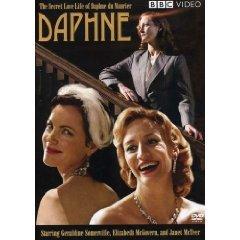“There’s nothing sinister about this happy wife.”
 The BBC drama Daphne is certain to attract those curious about the British author’s arguably most famous book, Rebecca. This biopic concentrates on a relatively small period of Daphne du Maurier’s life and focuses, very intensely, on the significant relationships with women in her life. It’s a frame story beginning in 1952 and then flashing back to her husband’s returns from WWII. At this point in Daphne’s (Geraldine Somerville) life, she has penned the novel Rebecca (the film doesn’t mention her other, earlier novels to this point) and she and her husband Tommy (Lieutenant-General Sir Frederick “Boy” Browning) have three children. Tommy’s return–built up to be some romantic reunion–turns out to be a disappointment.
The BBC drama Daphne is certain to attract those curious about the British author’s arguably most famous book, Rebecca. This biopic concentrates on a relatively small period of Daphne du Maurier’s life and focuses, very intensely, on the significant relationships with women in her life. It’s a frame story beginning in 1952 and then flashing back to her husband’s returns from WWII. At this point in Daphne’s (Geraldine Somerville) life, she has penned the novel Rebecca (the film doesn’t mention her other, earlier novels to this point) and she and her husband Tommy (Lieutenant-General Sir Frederick “Boy” Browning) have three children. Tommy’s return–built up to be some romantic reunion–turns out to be a disappointment.
The plot shows Daphne mired in boredom, trapped in a comfortable married life and yearning for something, and that something comes along in the form of American publisher Nelson Doubleday’s beautiful wife, Ellen (Elizabeth McGovern). The two women are thrown together when Daphne travels to America to answer allegations of plagiarism.
Based on Daphne du Maurier’s letters and biographies, the film follows Daphne’s life for just a few short years, through the plagiarism suit and up to the time she pens another hit book, My Cousin Rachel. The film hints at the darker themes explored in du Maurier’s books that are echoed in her real life.
Daphne is a film that grew on me. For the first portion of the film, I did not particularly enjoy Geraldine Somerville’s portrayal of Daphne. Daphne’s wide strides became almost German goose steps, and the demeanor of the lady-of-the-manor somewhat contrived and overdone. But by the time the glorious, colourful actress Gertrude Lawrence (Janet McTeer) appeared on the scene, things really warmed up.
Both Daphne and Ellen are somewhat confused women, and in contrast the marvelous Gertrude Lawrence, a woman who knows what she wants and how to get it, swoops in and takes over. Daphne du Maurier is portrayed as a woman who never seems entirely comfortable with the roles handed to her by society, and yet she also has difficulty fully accepting her attraction to women. So it’s not particularly surprising that she should end up being so influenced by Gertrude’s powerful character. Daphne has a horror of what she calls the “L” word, yet while she seems to idealize Ellen Doubleday, she still has a need for physical passion.
The film doesn’t explore Daphne’s relationship with her famous father, and so true to the film’s focus, the men in Daphne’s life remain superfluous. Directed by Clare Beavan.
A good companion piece to this film is the BBC drama Portrait of a Marriage–the story of Vita Sackville-West’s love affair with Violet Keppel. Oh and by the way, in case you are curious, my favourite du Maurier books are The House on the Strand and The King’s General.

You must be logged in to post a comment.